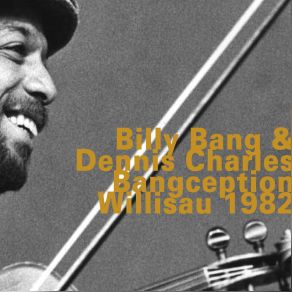Bangception, Willisau 1982 (Live)
Download links and information about Bangception, Willisau 1982 (Live) by Dennis Charles, Billy Bang. This album was released in 1982 and it belongs to Jazz genres. It contains 5 tracks with total duration of 41:46 minutes.

|
|
|---|---|
| Artist: | Dennis Charles, Billy Bang |
| Release date: | 1982 |
| Genre: | Jazz |
| Tracks: | 5 |
| Duration: | 41:46 |
| Buy it NOW at: | |
| Buy on iTunes $9.99 | |
Tracks
[Edit]| No. | Title | Length |
|---|---|---|
| 1. | Air Traffic Control (Live) | 14:19 |
| 2. | Lonely Woman (Live) | 6:13 |
| 3. | Thelonious (Live) | 7:21 |
| 4. | Closer to the Flower (Live) | 6:47 |
| 5. | Know Your Enemy (Live) | 7:06 |
Details
[Edit]This 1982 date by violinist Billy Bang (previously with Ronald Shannon Jackson & the Decoding Society) and the late drummer Denis Charles is, for lack of a better term, a full frontal attack on the senses. In his liner notes, Art Lange makes the case for Bang being the focal point of this recording. That's fair enough, considering that his name is first and it's kinda named after him, but Lange, in this very rare case, misses the point. Bang's phrasing in the opening improvisation "Air Traffic Control" comes right out of Charles' opening solo. Charles' rolls and stuttered rim shots grant Bang a passageway into his own beginning. Later in the track when Charles is slashing his cymbals and Bang is sawing through chords to match the dynamic, it becomes obvious just how much a collaboration this set is. When Bang cues up Ornette Coleman's "Lonely Woman," again, it's the hushed cymbal and brushes work of Charles that opens a dimensional door for Bang's idiosyncratic read of the melody. Charles punctuates it in all the right spaces, keeping the framework of the tune from disappearing into the improvisation. And so it goes, with this pair crisscrossing back and forth over the great divide of improvisational phraseology. Charles' tone on the drums is low, not thunderous but like rolling thunder in the distance; his brushwork is blinding and full of control. Bang literally invented a method of playing the new music on violin. His phrasing and improvisational ideas are sometimes outrageously childlike and simple and in the next moment as wily and complex as you are likely to hear in Western harmony. And while it is true that this is a skeletal set, as full of space as it is "music," it is very satisfying nonetheless.